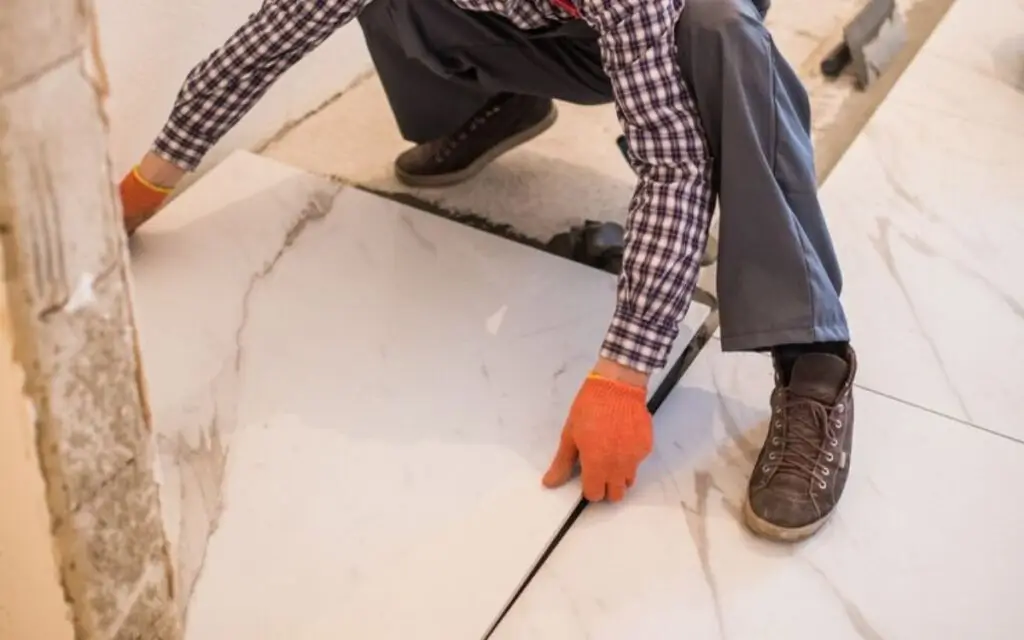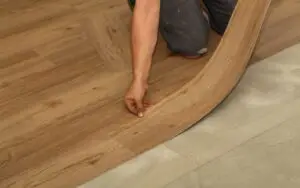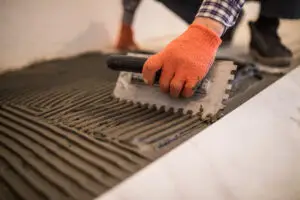Understanding Kitchen Flooring Needs
Key Considerations for Kitchen Flooring
Durability
Durability is one of the most important considerations when choosing flooring for a kitchen. Kitchens are high-traffic areas that are subject to spills, dropped items, and frequent cleaning. The flooring you choose should be able to withstand all of these challenges, without showing signs of wear, scratches, or dents. It is best to choose a flooring material that has a long lifespan, and that will also look great for many years to come.
Water Resistance
Water resistance is another essential factor to consider, as kitchens are prone to spills, leaks, and moisture. Your flooring should be water-resistant to prevent any water damage, and it should also be able to hold up to frequent mopping. Materials like stone and tile are excellent options for water resistance, which is why they are such popular choices for kitchens.
Stain Resistance
Stain resistance is also important, as kitchen floors are likely to be exposed to food spills, grease, and other types of messes. Choosing a stain-resistant material will make it easier to clean up spills, and will help prevent any long-term damage or discoloration to your floors.
Maintenance
The amount of maintenance that a flooring material requires is also a key consideration. Kitchens require frequent cleaning, and you will want to choose a material that is easy to clean and maintain. Stone tile is a great option, as it is easy to clean, however some types of stone will require more frequent maintenance than others.
Style
Style is another important consideration, as your kitchen flooring should complement your overall kitchen design. The color, pattern, and texture of the flooring should blend seamlessly with your cabinets, countertops, and appliances. You should always take time to consider the various design styles, to make sure you choose a flooring option that fits your aesthetic goals.
Why Stone Tile is a Popular Choice
Natural Beauty
One of the most appealing qualities of stone tile is its natural beauty. Stone tile offers a unique, elegant, and timeless look that can enhance the value, and appeal, of any kitchen. The natural variations in color, pattern, and texture, will add a great deal of character to your space, while also being a very durable and long-lasting option.
Longevity
Stone tile is also known for its exceptional longevity. When properly installed, and maintained, stone tile can last for decades, or even a lifetime, making it an excellent investment for your home. Stone is an excellent choice for homeowners who do not want to have to replace their floors anytime soon, and it also makes it a very attractive option for home buyers.
Value
Stone tile flooring adds value to your home, and will provide a great return on investment, due to its appeal to potential buyers, and also due to its long lifespan. Potential buyers will be impressed with the durability, and beauty, of stone floors, and will often be willing to pay a premium for this type of material. This is one of the best ways to add value to your home, while also creating a more beautiful and functional space.
Top Stone Tile Options for Kitchens
Granite
Durability and Resistance
Granite is an exceptionally durable stone, that is highly resistant to scratches, stains, and heat. This makes it an excellent choice for kitchens, which tend to have a lot of foot traffic, and are prone to spills, and messes. Granite can easily handle all types of heavy use, and when properly maintained, it will continue to look great for many years to come.
Style and Appearance
Granite is available in a wide range of colors, patterns, and textures, which makes it a versatile choice for many different kitchen styles. It can range from light and airy, to dark and dramatic, and will always enhance the beauty of your kitchen.
Maintenance
Granite is one of the easiest types of stone to maintain, and it only requires routine cleaning with mild soap and water. It is also recommended to seal the granite every 1-3 years, to protect it from staining, and to help keep it looking its best for many years to come.
Slate
Durability and Resistance
Slate is another excellent choice for kitchens, due to its durability, and its natural slip-resistant texture. It is highly resistant to scratches, stains, and moisture, and is also very easy to clean, and maintain, which makes it a great option for busy homeowners.
Style and Appearance
Slate offers a unique and earthy aesthetic, that can add a rustic and natural look to any kitchen. It is available in a range of colors, including gray, black, green, and purple, allowing you to create a custom look that perfectly matches your design preferences.
Maintenance
Slate is relatively easy to maintain, and only requires regular sweeping, and mopping, with mild soap and water. It is also recommended to seal the slate every 2-4 years, to protect it from moisture, and help it retain its original beauty for many years to come.
Travertine
Durability and Resistance
Travertine is a durable, and attractive option, for kitchen flooring, and can easily handle a good amount of foot traffic. It is also more porous than granite or slate, which means it is more prone to staining, and moisture damage. It will also require regular sealing, and more diligent cleaning, compared to other stone options.
Style and Appearance
Travertine has a unique, textured surface, and a warm, earthy tone, that will create a rustic and inviting atmosphere in your kitchen. The distinctive appearance of travertine, makes it a great option for homeowners who want a unique and natural look.
Maintenance
Travertine requires regular sealing, and gentle cleaning methods, to maintain its appearance. It is also essential to promptly clean up any spills, to prevent staining. Some types of cleaners can damage the surface of travertine, so it is also essential to only use products that are specifically designed for use on this type of stone.
Other Considerations
Cost
Material Costs
When considering a new kitchen floor, you should always consider the cost of the flooring material, and compare the different types of stone. The cost of stone tile can range from $5 to $20 per square foot, depending on the type of stone, its quality, and the supplier. It is wise to get quotes from a variety of different installers, and also to do your research online, so you can make sure that you are getting the best possible value.
Installation Costs
Installation costs are also a significant part of the overall budget, and can vary depending on the complexity of the project, and the experience of the installer. It is always wise to get multiple quotes from professional installers, and to carefully review all of the costs that are listed in the estimate, so you can be sure there are no surprises.
Professional Installation
Importance of Proper Sealing
Proper sealing is essential for protecting your stone kitchen floor, and for ensuring its longevity, and it is always best to hire a professional to perform this work, as there are specific techniques that need to be followed to ensure it is done correctly. Professional installers will also be able to guide you on the best types of sealers for your specific type of stone.
Value
Professional stone flooring services can be well worth the investment, as they will ensure a high-quality installation, that will last for many years to come. They can also provide expert advice on the best type of stone, and cleaning techniques to keep your floors looking their best.
DIY vs Professional Installation
Challenges
DIY stone flooring installation is prone to many challenges, such as the potential for errors, and the fact that it requires a great deal of time, and physical labor. Stone tile installation also requires specialized tools, and if you are not experienced with the proper techniques, it is possible that you will damage the tiles, which will increase the overall cost of the project.
Benefits
Hiring professional flooring installers will ensure that your floors are installed correctly, and are built to last. Professional installers also provide warranties on their work, which gives you peace of mind. They can also complete the installation quickly and efficiently, which will limit the amount of disruption to your home life.
Case Studies: Successful Kitchen Stone Floors
Example of Durable Granite Kitchen
A homeowner installed granite flooring in their kitchen, and the floors were able to withstand many years of heavy use, without showing any signs of wear. The granite was also easy to clean, and maintain, and the homeowners were very happy with their choice. The homeowners also were very happy that they chose a professional installer, because the floors were built to last.
Example of Rustic Travertine Kitchen
Another homeowner chose travertine flooring for their kitchen, and it added a touch of rustic charm, to their space. The travertine was also durable, and long lasting, and the homeowners were very pleased with the overall appearance of their new floor, as well as with the increase in value that it provided for their home.
FAQs & Answers
Certain stone tiles are more suitable for kitchens than others, depending on their durability, water resistance, and stain resistance, which are essential characteristics due to the high levels of activity that a kitchen often receives. Granite and slate are two of the most common, and durable choices for kitchens, but it is always best to discuss your specific needs with a professional installer, to get the best possible results.
Granite flooring holds up very well in a busy kitchen environment, due to its exceptional hardness and its resistance to scratches, stains, and moisture, and it is also very easy to clean. These characteristics make it a great choice for even the busiest kitchens. Professional installers are highly skilled in all aspects of granite installation, and can help you to choose the best materials, and to create a design that is both functional, and beautiful.
Travertine offers a unique, and rustic look, which can add a great deal of beauty to a kitchen. It is a very durable material, and can handle a good amount of foot traffic, but it is more porous than granite, which makes it more prone to stains, and moisture, which can be common in kitchens. Proper sealing is very important to protect travertine. Professional installers can also offer advice on which types of maintenance practices will be best for your travertine floors.
Sealing is absolutely necessary for most types of stone tile flooring in a kitchen, especially for more porous stones such as marble, limestone, and travertine. The frequency of sealing will vary, depending on the type of stone, and the amount of traffic it receives, but it is generally recommended that stone floors be sealed every 1-3 years. A professional can perform a test to see if your floors need to be sealed, and they can also perform the sealing if you prefer.
Professional stone tile installation contributes to the overall longevity, and appearance, of kitchen flooring, by ensuring proper subfloor preparation, precise tile laying, and expert sealing and finishing techniques. These expert techniques will ensure that your floors look great, and are also built to last for many years to come. Most professional installers will also offer warranties, which will give you added peace of mind that your investment is well protected.





